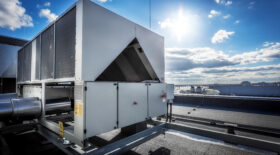To keep utility costs under control, it is extremely important that all technical building systems would be as optimal as possible and any energy losses would be minimal. In the context of high energy costs, now is the best time to make sure that heating, ventilation, cooling, lighting, and renewable energy systems work as the designers of the building intended. You might learn that you are partly paying the energy bill of your neighbours due to an error in the system or simultaneously heating and cooling your premises.

This type of systemic complex testing to determine whether technical building systems work in conjunction with building automation is currently obligatory in the buildings of Riigi Kinnisvara Aktsiaselts and in buildings that have been awarded a LEED (Leadership in Energy and Environmental Design) certificate. Requiring that contractors conduct complex testing in all buildings under construction is useful for assuring the owners and users that the systems have the required functionality, have been thoroughly tested, and have no significant shortcomings.
What aspects in the functioning of technical building systems are tested?
The main focus is to make sure that the systems operate well together according to their respective schedules and set values at various times of use (for example, during working hours, outside working hours, and on weekends) and in different climatic conditions (for example, in extreme outdoor temperatures). Many offices and production facilities use smart systems that adjust electricity consumption as needed – energy consumption is reduced to a minimum outside working hours (such as at nights or weekends) to save money and protect the nature. If these systems do not work at the intended capacity, the energy consumption might be needlessly high. In addition, inefficient technical building systems might disrupt the main activities of the users of the premises. For example, if employees are not guaranteed a high-quality indoor climate, it will affect their ability to concentrate and their productivity.
The goal of a performance test is to verify the purposeful and energy-efficient operation of technical building systems. For the best results, the test should be conducted in the final stages of completion of the building. Later, when the building already is in use, testing should be repeated regularly to monitor the operation of technical building systems and assess the energy consumption of the devices in various climatic and operational conditions. For example, during the first year that a building is exploited, we recommend monitoring the operation of systems consistently, even if they can be controlled and changed by managers and users of the building.
Regular inspections help to identify the inefficient operation of technical building systems or their non-compliance with the design. Complex testing helps to identify when the heating and cooling systems are working simultaneously or whether the cooling system actually shuts down as required to save on energy costs when someone opens a window. In addition, testing indicates when an alarm is not triggered in the control system of a building, a sensor stops working, or a device has not survived a power cut. Moreover, you can identify whether you pay for electricity based on your actual consumption or you are partly paying the electricity bill of your neighbours for some reason. Such tests help to eliminate wasteful deficiencies, ensure a high-quality working environment for the users, and save on utility expenses.
You can also order the maintenance of nearly all technical building systems from us. The list of services is available here.


